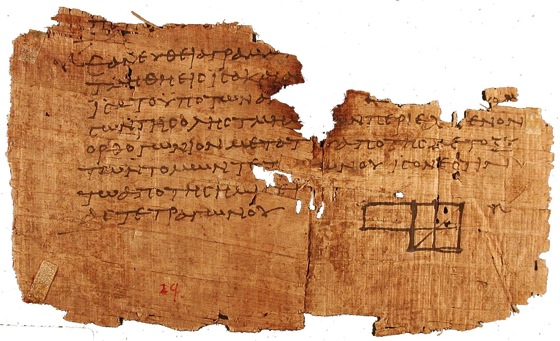It doesn’t matter how old you get, there is always something new to learn. Sometimes these new things are words or concepts you have heard all your life, but perhaps you never understood. Learn Something New is a series that will highlight some of the things I learn, big and small in the coming days. — Douglas
Syllabus
Spend any time in school and you will be presented with a syllabus, if not countless syllabi, at the beginning of each class. I was familiar with the concept of a syllabus, but in reading a new book, The Swerve: How the World Became Modern by Stephen Greenblatt, I came across a short description of the origins of the syllabus, which date far back to Ancient Greece.
P. Oxy. I 29, one of the Oxyrhynchus papyri, includes a fragment of Euclid’s Elements. via Wikipedia
I vaguely remember such a description from somewhere in my deep, dark, educational past, but it made be want to learn a bit more about syllabi, their history and their uses.
For most of us on the modern day, a syllabus is a table of contents, a calendar or even a contract between the teacher (usually a college professor) and their students. It usually lays out the concepts that will be studied, books that will be used, a calendar for topics, quizzes, tests and other major events during the term of the class. They can be detailed or general, depending on the teacher and the educational institution for which they work. This is quite a change from what was, in antiquity, basically a table of contents or short index of the papyrus roll it was attached to.
Like many ancient words, syllabus seems to be a misreading/miscopy of a Ancient Greek word which was introduced as scrolls were copied over and over. It is quite amazing how language changes over time, usually through mistakes or misreadings than concious choice.
According to the Oxford English Dictionary, the word syllabus derives from modern Latin syllabus “list”, in turn from a misreading of the Greek σίττυβας sittybas “parchment label, table of contents”, which first occurred in a 15th century print of Cicero‘s letters to Atticus.[1][2] Earlier Latin dictionaries such as Lewis and Short contain the word syllabus,[3] relating it to the non-existent Greek word σύλλαβος, which appears to be a mistaken reading of syllaba “syllable”; the newer Oxford Latin Dictionary does not contain this word.[4] The apparent change from sitty- to sylla- is explained as a hypercorrection by analogy to συλλαμβάνω.[4]
Because the word syllabus is formed in Latin by mistake, the Latinate plural form syllabi might be considered a hypercorrection.[5] The OED, however, admits both syllabuses and syllabi as the plural form.[1] — Wikipedia
More information on Syllabus and other Word Origins:
- Syllabus on Wikipedia
- The Curious and Quibbling History of “Syllabus” (part 1)
- Origin of English word SYLLABUS
Previously on Learn Something New:






